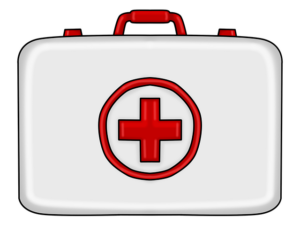 Being organized can be especially helpful in times of emergency. It is a good idea to have an emergency kit ready to go, and to have a plan that is communicated to all members of your household. The list of items that could be needed is exhaustive and endless. The importance of being prepared means you have the supplies and documents ready for your household in case of an evacuation, as a worst-case scenario. Keep in mind, business could be closed, banks could be closed and the internet could be down. Here is a guide of suggestions to getting organized for emergencies. A formal kit can be found at ready.gov.
Being organized can be especially helpful in times of emergency. It is a good idea to have an emergency kit ready to go, and to have a plan that is communicated to all members of your household. The list of items that could be needed is exhaustive and endless. The importance of being prepared means you have the supplies and documents ready for your household in case of an evacuation, as a worst-case scenario. Keep in mind, business could be closed, banks could be closed and the internet could be down. Here is a guide of suggestions to getting organized for emergencies. A formal kit can be found at ready.gov.
Food and Water
- 7- to 10-day supply of non-perishable food and water
- Include some comfort foods to help ease anxiety
- One gallon of water per person per day as a guideline
Money
- Small denominations, ten-, five- and one-dollar bills
- To purchase food, gas, other daily needs
- Amount depends on the size of your family ($2,000 cash is a good starting point to allow for basic needs and travel if evacuation is needed)
Medications
- Prescriptions for at least two weeks
- Non-prescription including pain relievers, stomach remedies, cough and cold remedies, fluids with electrolytes, and vitamins
- Medical records
Documents
Store copies of these in a fire proof safe inside a water-tight container, in a bank safe deposit box, and copies at a trusted friends or relative. You can also keep a digital copy in a removable drive.
- Personal Information
- Driver’s license or another photo ID
- Birth certificates, adoption certificates, custody documents
- Marriage license, divorce degree
- Social security card
- Child identity cards
- Passport/green card, naturalization documents
- Military: military id, military discharge record
- Pet: id tags, prove of ownership, microchip information, emotional support letter, certification for service animals
- Household Information
- Name, date of birth, place of birth
- Address and mailing address
- Name of spouse or partner
- Employment information including supervisors with contact information
- Spouse employment information
- Emergency contact
- Children information: name, address, date of birth, email, phone, school
- Financial and Legal
- Estate planning
- Living will, trust, power of attorney and advanced directives
- Financial
- Checking, saving, investments, retirement
- Print and keep a hard copy of the most current bank: name of institution, type of account, account number, institution phone number and website
- Sources of income
- Pay stubs, government benefits, alimony, child support, rewards accounts
- Tax Statements
- Previous year’s tax return, property tax, personal property tax
- Insurance
- Health, property, life, automobile, disability, appraisals, pet, flood, funeral
- Firm name, name of policy holder, policy number, claims phone number, type of policy, value, coverage period, website
- Understand how your home or renter’s insurance can assist you in an emergency
- Video or photograph rooms in your home and valuable belongings
- Financial Obligations
- Housing, utility, loan, credit card, child support
- Have a list of what bills are on autopay, download and print a copy of your last statement or applications to enroll
- Document and print your FICO score
Fuel
- Keep tank of gas above half full at all times
- Have fuel available for your back up generator
Supplies
- Battery-powered or hand crank radio and NOAA Weather Radio with tone alert
- Flashlight and extra batteries
- First aid kit
- Whistle
- Dust mask
- Plastic sheeting and duct tape to create a shelter
- Moist towelettes or wet wipes, trash bags with ties for personal sanitation
- Tools (wrench or pliers) to turn off utilities
- Can opener for canned food
- Local maps
- Cell phone with charger
- Battery pack charger for phone
- Personal hygiene supplies
At Top Shelf, we love to help busy families plan and prepare. If thought of planning for an emergency is overwhelming, see how Jayme and her team can help.
